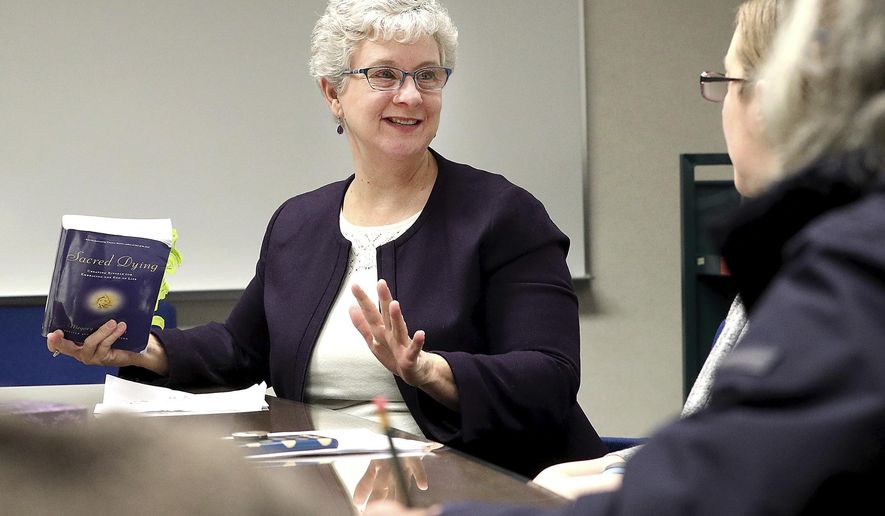LA CROSSE, Wis. (AP) - The name “Death Cafe” is startling, perhaps conjuring images of Wednesday and Morticia Addams serving tea with a side of eyeballs. But in reality, the concept is far from morbid.
Originating 17 years ago in London, the Death Cafe phenomenon has migrated stateside during the past six years, making its La Crosse debut in 2016 with a Facebook group, with four gatherings held thus far.
Created by Brit Jon Underwood and inspired by the writings and “cafe mortels” hosted by Swiss sociologist Bernard Crettaz, Death Cafes offer a confidential, judgment-free and nondenominational environment to openly discuss concepts of mortality. Often paired with cake and coffee, Death Cafes are not intended to serve as grief counseling but rather an opportunity to share or query without being led to “any conclusion, product or course of action,” according to the official Death Cafe website.
Since 2011, about 5,900 Death Cafes have been hosted in 55 countries, and the La Crosse Public Library recently hosted its first Death Cafe, facilitated by Dr. Jackie Yaeger, palliative care physician and hospice medical director for Gundersen Healthcare and certified Sacred Passage Doula of the Conscious Dying Institute. While facilitators need not be professionals in the fields of medicine, death or grief, they are expected to have “an enthusiasm for talking about death and dying, empathy, clear boundaries, flexibility and a friendly manner.”
“People are hungry to talk about their experience with friends and family dying and their own fears about dying,” Yaeger told the La Crosse Tribune . “It’s healthy to talk about. … We can approach dying in a way to give it the reverence it deserves.”
Four individuals attended the discussion, co-hosted by technology librarian Lindsay Schmitt, sharing personal stories, hopes and uncertainties. Death Cafes are often populated by strangers, finding uninhibited talk of death either taboo or avoided in their families.
“This is wide open to whatever we want to talk about,” Schmitt told the group.
Schmitt herself shared she struggled to cope with the deaths of young friends, and, as the descendant of survivors, reconcile the anger she felt over the lost lives of the Holocaust.
Gregory Wegner, a retired UW-La Crosse history professor and author of “Anti-Semitism and Schooling Under the Third Reich,” shared his own thoughts on the millions who died under Nazi Rule, and acknowledged the present day loss of individuals close to him.
“I’m here to search about the meaning of life and death in this early 21st century,” Wegner said. “And I’d like to thank all the people who died before me, my friends and family, who left behind their wisdom for me to learn from.”
Poignantly, Underwood, who held the inaugural death cafe in his home in Hackney, East London in September 2011, passed last June at age 44 after a battle with acute promyelocytic leukemia. In a web post, his wife Donna Molloy, wrote, “Through his work helping people come to terms with the idea of death, Jon was uniquely and unusually aware that life is short and appreciated his life fully…He lived every day reflecting very consciously on the fact that none of us know how long we have and focused completely on being present in, and making the most of, every minute.”
Yaeger appreciates Molloy’s sentiments, and hopes, even if conversations become emotional, guests will leave the Death Cafe feeling inspired to appreciate the joys and loves in their lives rather than dwell on their finite nature.
“By studying and understanding death,” Yaeger said, “I think it does help us live better.”
___
Information from: La Crosse Tribune, http://www.lacrossetribune.com




Please read our comment policy before commenting.